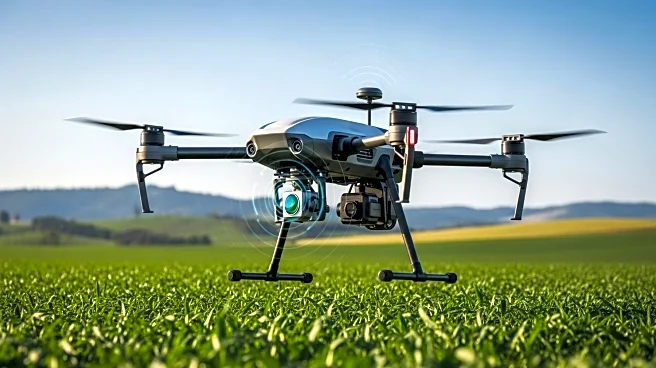What is the story about?
What's Happening?
The U.S. drone farming market is poised for significant growth, driven by advancements in AI-enabled technologies and precision agriculture. Recent developments include PrecisionHawk's launch of an AI-enabled drone fleet for crop monitoring, DJI Agriculture's deployment of autonomous spraying drones, and AgEagle's introduction of precision mapping drones. These innovations aim to enhance crop management, optimize resource usage, and improve yields. The market is expected to expand rapidly as farmers adopt drones for tasks such as multispectral imaging, pest detection, and irrigation management.
Why It's Important?
The growth of the drone farming market in the U.S. reflects the increasing reliance on technology to improve agricultural productivity and efficiency. Drones equipped with advanced sensors and AI capabilities offer farmers real-time data for informed decision-making, reducing labor costs and optimizing input usage. The adoption of drone technology supports sustainable farming practices and addresses the rising global food demand. As drones become integral to modern agriculture, they are set to transform farming operations, enhancing profitability and risk management for farmers.
What's Next?
The U.S. drone farming market is expected to continue its expansion, with further innovations in drone technology and AI integration. Government initiatives and subsidies promoting digital and mechanized farming may accelerate adoption, supporting market growth. The development of new drone applications, such as precision spraying and soil analysis, will likely drive further advancements in agricultural practices. As the market evolves, stakeholders may explore opportunities for collaboration and investment to capitalize on the benefits of drone farming.
Beyond the Headlines
The rise of drone farming in the U.S. may prompt discussions on the ethical and environmental implications of technology-driven agriculture. The integration of drones into farming practices could lead to debates on data privacy, regulatory standards, and the impact on traditional farming methods. Additionally, the widespread adoption of drones may influence cultural perceptions of agriculture, highlighting the role of technology in shaping the future of food production.

















